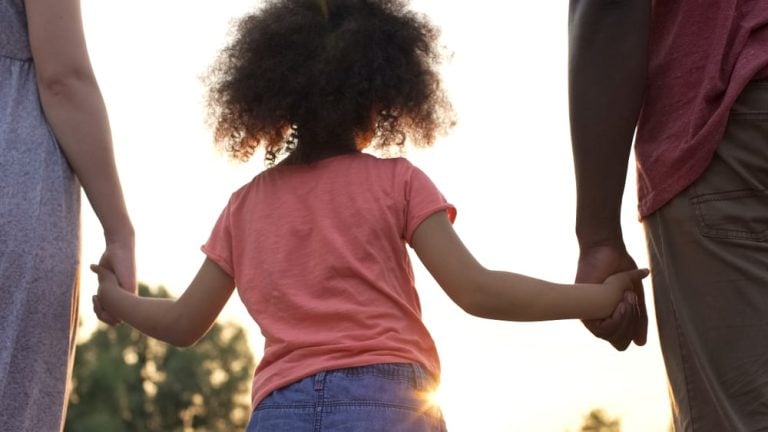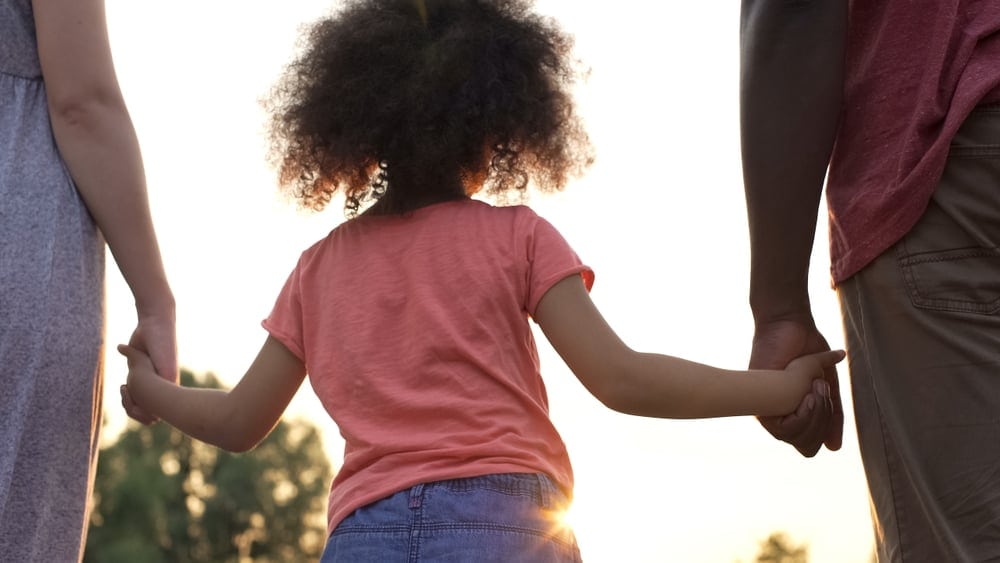Divorce can be hard on children, but there are ways to deliver the news that will help your kids understand that they’re still loved and not responsible for your marriage ending. Once you’ve told them you’re getting a divorce, you can focus on supporting them and making sure their emotional needs are met.
No parents ever dream of having to tell their children that they no longer want to be together, but it’s a very real scenario for millions of Americans. In fact, 50% of all children in the U.S. will witness the end of their parents’ marriage.
If you’re planning on getting a divorce, you and your spouse have a duty to make sure you present the news to your kids in a healthy way.
Use ‘we’ language and highlight how much you love them
When the time comes to break the news, it’s best that both parents sit down together to discuss the divorce with the children.
“Approach the situation as a united front. Plan what you’ll say in advance and explain the changes your child can expect as concretely as possible,” said Dr. Tanisha Johnson, a licensed professional counselor who operates in the Atlanta area.
“Telling the news together is key to helping the child understand that they have access to both parents while they process the news. Be sure to use ‘we’ language and emphasize that both parents love them, and that the decision to separate isn’t their fault.”
If you’re struggling to understand how to present a united front with your spouse, consider these examples provided by Johnson (all of which use “we” language):
- “We tried to work out our differences but decided it’s best if we separate.”
- “We have some adult problems that we cannot work out, so we decided we cannot live together anymore and do not want to stay married.”
- “We aren’t happy together like we once were, and we’ll both be happier if we separate.”
- “We hoped this would not happen, but we know that separating is for the best.”
- “We both want different things in our lives, so we decided it’s best that we separate.”
Be sure to emphasize that your child had nothing to do with the divorce, and that both you and your spouse will continue to love them just as much as you always have. Be completely honest with what is to come; explain what will stay the same and what will change.
The location of the talk is just as important as the discussion itself, according to Johnson, who says it should take place “in an environment where the child feels comfortable, and where they can be open and honest about their thoughts and feelings.”
Be empathetic and prepare to answer questions
It’s extremely important that parents understand that divorce isn’t just between the spouses; it’s a major life change for children, as well. That’s why parents should encourage their kids to ask questions and express their emotions, which Johnson said might include feelings of anger, guilt, confusion, self-blame, abandonment, anxiety, or uncertainty.
“Understand that these feelings are expected within the context of the situation. Create an empathy environment to support your child and provide reassurances about how they’ll be provided for, and how each parent plans to care for themselves.”
Expect behavior changes
Johnson said that parents should expect possible behavior changes to occur as the child works through their feelings. They might experience sleep or eating changes or show an increased need for affection.
“Those changes should be met with patience and grace,” said Johnson.
While younger children might need an explanation of what exactly divorce means, older children and teens might be focused on the “why.” Parents should be as honest as possible, within limits, as some information might do more harm than good.
“The talk about the split should in no way be used as an opportunity for the parents to air their dirty laundry to their children or place blame on each other,” she said.
Johnson noted that if children learn about certain details of the divorce (such as one parent’s infidelity) it could foster resentment from the child and alter their view of the unfaithful parent and relationships in general.
“The details and specific events are less important than explaining the reason for the decision to divorce,” she said.
Support your child as they process your divorce
Your child will require a great deal of support from you to minimize the trauma associated with the divorce.
To help mitigate some of the emotional shifts that could occur in younger children, Johnson suggested that both parents ensure the child has a consistent routine, rules, and home expectations.
“The more consistent the parents are, the better adjusted the child will be,” she said, adding that individual and family counseling can help children understand the changing dynamics and provide an outlet for them to express their feelings in a safe and supported way.
Seek out support with other children
Parents should also emphasize that their child is not alone, and they may wish to seek support services where their child can connect with other young people experiencing similar family changes.
When it comes to younger children, Johnson suggested that parents encourage creative and expressive art activities to help with their emotions, facilitate family meetings which can foster open dialogue, and read books about divorce with their child.
Meanwhile, older children and teens will have thoughts and opinions that deserve to be taken at face value, Johnson said.
“Parents should create opportunities for their child to be expressive about their thoughts and feelings,” she said, adding that older children might also benefit from counseling, support groups, and journaling.
And although an older child may be mature enough to have adult conversations, parents should avoid relying on them for emotional support or venting to them about their partner.
“Children mostly just want to be heard. Sadly, I hear many kids say in therapy that no one talked to them about the divorce or allowed them to ask questions. Children who can express their feelings and feel heard and supported by their parents tend to deal with their emotions and changes much better.”
Although telling your children that you’re getting a divorce won’t be easy, taking these steps can help your kids feel supported and loved during one of the hardest moments of their lives.






